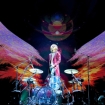In the immaculate interiors of an uptown Manhatten hotel room, Yoshiki — the iconic leader of beloved Japanese band X Japan and celebrated composer — makes himself comfortable in the seat across from me. His long scarf rests on the floor, and his intense eyes peek past his glasses.
For someone as famous as he is, Yoshiki is still one of the most enigmatic figures in all of rock music. He's revered by many, known by few. The words to his story lie between the score lines of all the music he's released over the past 40 years.
One of the most influential generation-spanning musicians in Japanese history, Yoshiki's work has placed him at the forefront of the rock scene in his homeland, first, with X Japan and, more recently, the supergroup the Last Rockstars, featuring Hyde, Sugizo and Miyavi.
But he's also made his mark in classical music, recording multiple studio albums and collaborating with everyone from Sarah Brightman to George Martin. He's composed music for season three of the hit anime series Attack on Titan, as well as the Golden Globe Awards. In October, Yoshiki will take his Requiem tour on the road, celebrating the 10th anniversary of his Classical album. He will become the first Japanese musician to headline shows at the Tokyo Garden Theater, Royal Albert Hall Carnegie Hall, and L.A.'s Dolby Theater.
Treading new ground, Yoshiki has turned his creative energy to film, with the premiere of his directorial debut, Yoshiki: Under the Sky. Conceived in the wake of the pandemic, the documentary captures Yoshiki collaborating with artists from around the globe and across genres — from EDM superstars the Chainsmokers to heavy-metal legends the Scorpions to art-rock lightning rod St. Vincent. The movie also sees the Japanese icon reflecting on the exchange of power, energy and inspiration as he offers new, larger-than-life interpretations of hit songs.
Amid the all-star collabs, which find Yoshiki alternating between the keys and the kit, Under the Sky puts a microscope on his deepest thoughts and anxieties. He ruminates on the physical and arbitrary borders that separate people as he looks to the remnants of the Berlin Wall. Elsewhere, fans share their connection to the musician, looking to him as a cathartic figure. In an age of sickness, fear and unrest, Under the Sky is a proper ode to what Yoshiki has lost and what he has gained.
As our conversation progresses, Yoshiki's posture relaxes. His perfectly styled blond hair has a pesky strand that he fiddles with. A smile creeps on his face as if he's wrestling with the fine line between the outer rock star and the poet inside, keeping his best tidbits close to his heart in case inspiration strikes.
Shrouded underneath Yoshiki's glamorous image is raw, striking vulnerability that shines through every time he takes the stage. He opens up his wounds and heart in hopes that his music saves at least one person. Under the Sky is Yoshiki's thesis statement: Through music, we can achieve peace.
You've made history as the first Japanese artist to play at some historic venues. What has that been like?
Yoshiki Big pressure. I feel very grateful.
Why do you feel a pressure? Is it something with Western audiences?
I don't know. Especially to accomplish during this kind of busy schedule. The pressure is just in general. When I do classical, I have to practice piano a lot beforehand.
Do you have a practice schedule?
Well, I've been flying, flying, flying, so it's almost impossible unless you have a piano inside the jet.
In the documentary, St. Vincent explained said you're a rock star, and it's kind of intimidating. Do you think you're intimidating?
I'm not intimidating. I mean, I can play drums very hard. Onstage, I'm crazy. Offstage, I'm pretty normal.
What is the definition of a rock star in your eyes?
I don't know. It's like trying to believe in yourself like nothing's impossible. You can become superhero-ish. Anybody could be a rock star.
What was that representation like for you when you decided that you wanted to start making music? Was there anybody who you looked to that you were like, "I truly want to emulate that person," that made that persona that you're known for today?
I started playing classical piano when I was four years old, and my father took his own life when I was 10. That was a big turning point. I became so sad and angry. My mother bought a drum set, and then I started banging the drums. At that time, I was listening to KISS, Sex Pistols, Led Zeppelin. Then I started listening to Iron Maiden or something like that. That kind of fits my state of mind. I was so angry and sad. I tried not to kill myself. I was very suicidal.

Have you kept up with that coping mechanism, or have you also found other ways to be able to release those emotions that you have?
Not really. Just rocking or even playing piano is very soothing to calm down my crazy side. Even onstage, you can be anything. You can break everything — that's legit. If you do it outside the stage, then you're in trouble.
Controlled chaos.
I know! I started performing when I was very young.
What is that like for you? Music has been such a big part of your life for so long. It's basically all you can remember. What do you think you would be doing if it wasn't that?
I'm pretty sure if I'm not doing this, I'm dead. Pretty sure. Yeah, 100%.
What do you think was that turning point where it kind of clicked for you?
When I found out somebody decided not to kill themselves because of the music I created. Like, wow, I'm responsible for that. I think I did right.
It must be interesting for you, because you just see this as such an outlet for you, that sometimes it's easy to forget that people then internalize that. Like Dave Grohl has a quote that says something like, once he performs, everybody else then has their own interpretation. It's not really his anymore. You have a really interesting quote in the documentary in that you said you have no boundaries between you and the fans.
When I perform onstage and play music, I'm also saving myself, too. If the music can save myself, the music may be able to save the others. I kind of have a weird experience all the time when I'm playing on stage. My fingers are playing piano. I'm looking at the fingers moving, but the other side of me is just watching me performing.
Like an out-of-body thing?
Yeah, kind of. Last time when I played Carnegie Hall, I was like, "Holy shit." I was playing Beethoven. I was just listening and crying.

Do you ever lock eyes with someone in the audience?
I get a lot of energy from the audience, like a piercing, but it's very warm. Imagine a million needles coming to you. It's kind of a weird way of explaining. A million needles are supposed to be fucking painful, but it's not painful.
Do you have different experiences audience-wise between when you're playing with your band compared to classical?
Yes, when I'm playing, it's not being a rock star or anything. It's beyond that. It's just I give my entire myself to the audience.
Is that exhausting?
If I die at that moment, I'm very grateful.
Are you one of those musicians who thinks they'll die performing?
If that happens, that's the place, I guess. I don't want to be eaten by fucking sharks or anything in the ocean or stung by bugs.
Going back to the documentary, how did the collaborative process work? Did the other artists give you a rough idea of what they were thinking, or did you have freedom?
I like both. I'm pretty into freedom. I want to translate whatever that music is into my language, whatever musical language. I like it all as long as the music is beautiful.
How do you open yourself up to be receptive to that collaborative process?
As long as the other side is into music, I'm very grateful. I would not collaborate with just anyone. Music is everything when you are collaborating. Even when I'm writing music, it's everything.
How do you listen to music? Is it emotional or technical? It can be frustrating trying to turn it off.
So, I do have a perfect pitch. If I don't turn off that certain switch, the music comes without a musical score. I used to do it as a kid. I was transcribing music as a part-time job, so I can pretty much write the music at the speed of the music that is playing. So that means I can hear every single note to the score. That drives me crazy, so I need to turn off that switch first. I'm sensitive, too. If a guitar tune or some of the vocal tunes are not right, I know. I don't want to say who, but I need to turn off that switch, too. Just get drunk and enjoy music. That's how I do it.
Can you think of the last song or piece of music that evoked such a strong emotional reaction in you?
David Bowie's "Space Oddity." I met him when he was alive. I played Wembley Arena in London. He showed up and I started playing the song. That's such a beautiful song.
In Under the Sky, you say that the art that you create can last longer than we live. What is that process like to create that kind of music?
When you are writing it, you kind of know this song's already gonna last forever or not. I write everything in the music score when I compose. It's beautiful but nobody heard that because it's in my brain, nobody knows this music score. Then I start playing it. I don't want to be too morbid, but what's beautiful about this life is that life is going to end. If life doesn't end, life sucks. We appreciate every single moment. But [through music], I can live forever to support someone's mind. I don't know if I've made one yet, but I want to create art to last forever.
Wait, so you don't know if you've created something like that yet?
It sounds conceited if I say so.
I get that. It's kind of a never-ending process to try and get closer to a vision. What song do you think is the best representation of that, or the closest thing to that for you?
A few songs. A song called "Endless Rain," which is also a part of Under the Sky. So, at the end everybody starts singing, which it's kind of about going beyond boundaries. There's a song called "Kurenai." It's in schoolbooks in Japan. Also, I composed the piano concert for the Emperor's 10-year anniversary. That's part of the history.
Do you think there's value in whatever you deem to be "temporary art?"
Could be. It's hard to say which ones may last forever and which ones may be temporary. I think that if the music's just made to make money, it doesn't have soul. Artists just come with some kind of responsibility to... I don't know. It's just more than making money. It's hard to explain, but yeah.
I don't like the word "music business," to start with. I'm pretty notorious in terms of not releasing [music]. I understand that my fans are very frustrated, but why do you have to release an album once a year? Why do you have a seven-year contract? Because the music industry needs to survive. But 200 years ago, we didn't have anything like that. If you don't want to call me professional, that's fine. I'm not professional. I'm not really fitting into this music industry assembly line.
I like that you want to break out of these expectations people have of you. It can be frustrating for those around you.
I'm frustrated, too, sometimes. There's so many amazing artists around the world. So many songs are being made every day. You could make 10,000 songs in your lifetime, but some may not last. You don't need to be in a cycle of the record business to create. I have a label, so I'm little contradicting. But yeah, I just need one song. I want to save people's lives a hundred years from now, 200 years from now, 500 years from now. If you can create one, that's the most important.
Going back to the documentary, what's the purpose of these different collaborations. What purpose did that serve for you?
Well, first of all, music has no boundaries. Could be a boundary of the country or whatever. Also, genre. I just don't like walls. Also, the power of music. There's a story of my fan who died. According to her, the music made her life longer.
You said you don't like boundaries, which is why you're collaborating with everybody from the Chainsmokers, Lindsay Sterling and more. For you, do you feel like some of those walls were unfairly placed on you as a non-Western artist?
If you have a lens to look at that angle, maybe I can say sometimes. Was I being treated because of that, or because I was treated because I'm not talented enough? I don't know yet what kind of lens I should use to look at the situation. Sometimes I blame myself and say I'm not good enough. I think I was good enough, but I was not treated right. So, I think it depends. It could be a combination.
Does your process between writing for piano and drums change? Right before you link up with the Chainsmokers in the film, you say, "I just do the score without even thinking about the instruments."
Exactly. I don't use the musical instrument. I just write the score.
And that's interesting. So, you then transpose it to whatever you want to play and see how it sounds?
Yeah. I still make my band members crazy. I compose everything in my head. That's the best.
Does that get frustrating at times? Jimi Hendrix didn't know how to read music. A lot of different musicians, they kind of have that naiveté. Do you sometimes wish you had that instead of your technical ability?
I think either way, as long as you are putting your feelings into it, you don't have to read the music score. A music score is just an easy way to communicate. I'm just writing the music score to make sure I don't forget. You can just hum, play guitar, whatever. I know I'm just a little crazy.
We all have to kind of be a little bit crazy, especially to be doing this. X Japan released a new song recently, "Angel." What was that process like?
I'm not a little crazy, I'm very fucking crazy. So, I'm editing one song for several years.
That one song? Wow. How long do you think?
Five, six years? I don't know. I care about the silent moment of every single song, so I edit somebody's breath, move that breath five milliseconds, which is 0.005 seconds or something. I think I'm just pretty crazy, but it felt good. I just felt like I should release it because the song is so beautiful. I just feel like the world needs that song. I don't know.
Does it feel natural to you when you know that the song is done? Or is it something where eventually you have to pull yourself back?
Recording is part of the compromise. When you compose the music, you have a perfect vision or a perfect sound, then every time you record, it's painful. It's very depressing process, and it depends on how much you can compromise.
I also lost my father at a young age. What does that relationship between grief and music look like for you? And how has that evolved over time as you grow?
Well, I think I'm very positive-thinking person. I can create something beautiful, more beautiful music I can create. So, to be honest, without my father's death or being suicidal, I don't think I could create that kind of a deep, sad, heavy music. I think I can justify people's death. Instead of just crying and then just trying to kill myself, I decided to create art. I had to go through this kind of process to create the art, but the art can help people. Whatever the reason my father killed himself, I don't know. It's a question. Nobody knows. I'm going to have to live with that question mark the rest of my life, but he did make me create the beautiful music. So, I'm probably saving someone through him.
What do you want to be the main takeaway for this documentary?
COVID is a thing but also there's a war going on. On social media, people are sometimes hating each other, blah, blah, blah. I think we are meant to support each other, not hate each other. We are not meant to create a war and then divide ourselves from others. We are very lovable beings.
At the end of the day, everything is temporary. Within the short amount of time that we have, we've got to make sure that we're not assholes to each other.
Yes. Also, the title Under the Sky, we are still under the sky. The people who have to go to heaven, go up there. But as long as we are here under the sky, let's try our best. Live as much as we can and love each other.












